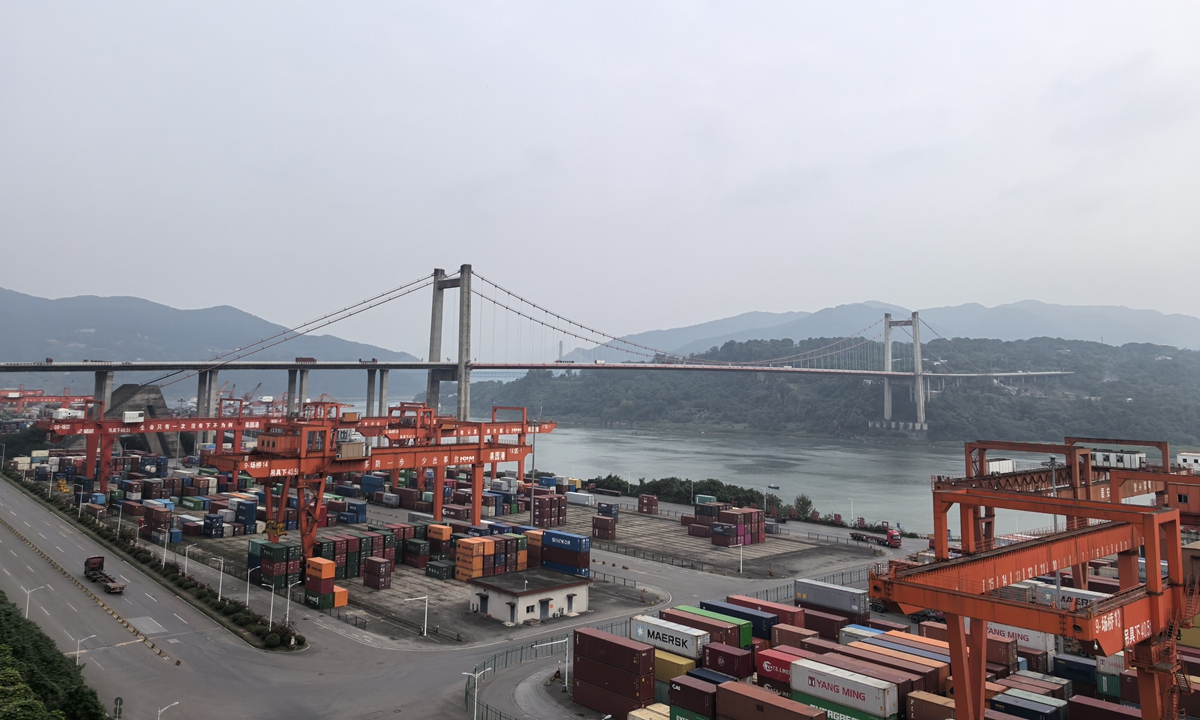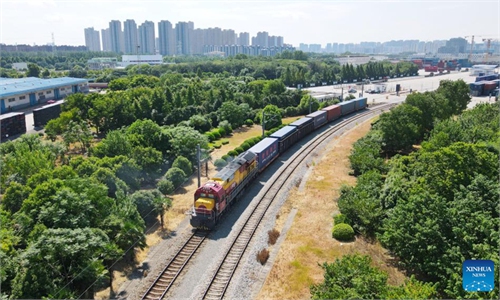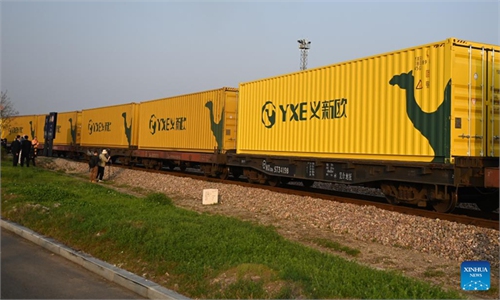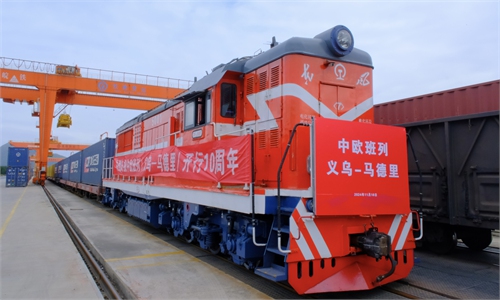Long-haul train runs ensure efficient trade between Chinese manufacturers and European households
Freight flows through Eurasia

A view of Guoyuan Port in Southwest China's Chongqing Municipality, one of inland departure stations of China-Europe Freight Train Service, on November 15, 2024 Photo: Zhang Yiyi/GT
On Tuesday, a China-Europe freight train carrying daily goods, electronics and machinery equipment departed from Jiangxi Province's Ganzhou International Inland Port, in East China, marking the 2,000th trip of its kind. The train passes through Erenhot Port in North China's Inner Mongolia Autonomous Region, reaching its European destination in about 15 days.
The National Development and Reform Commission (NDRC) said on Tuesday that the China-Europe Freight Train service now handles approximately 50,000 types of goods of 53 major categories. To date, more than 11 million standard containers of goods worth more than $420 billion have been delivered by the service.
Last year, the freight value operated by the China-Europe Freight Train service accounted for 7 per cent of China-Europe trade.
"Since its launch in 2013, the freight train service has attained improving efficiency, expanded the range of transported goods, by adopting a more integrated and digitalized system," Li Hongchang, a researcher at the Sustainable Transportation Innovation Center, and a professor from Beijing Jiaotong University told the Global Times on Tuesday.
"It has greatly strengthened trade links between China and the countries along the route, driving development in China's central and western regions, and helped shift China from being the world's manufacturing hub to a global trade hub," Li said.
More efficient service
"Compared to ocean shipping, China-Europe Freight Train service can provide more reliable transportation, with minimal impact from bad weather or other disruptions," Kong Zhijian, a representative from Yiwu lnternational Trade Market, in East China's Zhejiang Province, who has been importing goods from Spain for years, told the Global Times on Monday.
Kong noted that the Yiwu-Madrid rail line is ideal for transporting wines from Spain to China. "Faster transportation means quicker capital turnover and fresher goods for the consumers," he said.
The growing efficiency of China-Europe Freight Train service is reshaping global commerce, aided by the seamless coordination of each link in the transportation chain.
Li Yunsheng, a locomotive driver of China Railway Wuhan Group Co, said the group has strived to reduce freight loading and unloading time, which helped ramp up the efficiency of China-Europe Freight Train service.
"We have done our best to push the limits to improve the efficiency of China-Europe freight train operations," Li said. "After 2,000 trials, we have managed to save at least 15 minutes and 8 liters of diesel oil for each loading and unloading session," he added.
Yang Jie from Qingbaijiang customs port, which is under Chengdu Customs, told the Global Times on Tuesday that Chengdu Customs has completed a set of information-based system upgrading, achieving instant data sharing among different customs offices, freight train operation companies, and train stations that has significantly improved efficiency.
In addition, Chengdu Customs has pushed for rapid railway clearance that helps shorten goods check time, said Yang, adding that, currently, prioritized non-intrusive inspection can facilitate quick inspection for freight containers, improving efficiency and reducing costs.
Meanwhile, the freight structure has become more diversified with the proportion of high-tech and high-value-added products going up rapidly in the past years, according to China State Railway Group.

A foreign buyer discusses business with a vendor at the Yiwu International Trade Market on November 18, 2024. Photo: Zhang Yiyi/GT
High-value goods
"The trains are now transporting more high-value goods to European markets, such as electric vehicles and advanced manufacturing equipment, while the return train runs include more electronics, medical devices, and bulk commodities," Bai Xudong, an official from Yiwu market development commission told the Global Times on Tuesday.
Over the past decade, the China-Europe Freight Train service has sent a growing number of goods to the consumers on the line. A merchant named Meerzat Omuralieva from Kyrgyzstan noted that her company has greatly benefited from Yiwu's small-commodity market and the freight train service.
"I'm proud to have my residence largely settled in Yiwu, the starting point of the Yiwu-Madrid freight train line," Omuralieva told the Global Times. "Most of the goods managed by my company come from Yiwu and eventually exported to countries in Central Asia and the Middle East. The regular operation of the freight train service has made the import-export operations of my company a profitable business," she noted.
Poland, with its long history of apple cultivation, has leveraged the China-Europe Freight Train service to reach the Chinese market.
Unlike the 40-day journey by sea, the train delivers Polish apples to China in about 14 days. In 2023, China's apple imports from Poland increased by 23.2 percent in value over a year ago, according to China State Railway Group.
The long-distance freight train service fosters massively mutually-beneficial trade flows between China and Europe.
"Currently, China-Europe freight train operations cover 25 European countries and 227 cities - effectively connecting the entire Eurasian continent," Dong Hui, an official from the Freight Department of China State Railway Group told the Global Times on Tuesday.
"Also, the return-to-departure ratio has reached 84 percent, achieving a near-balanced operation with seven outbound and six inbound train runs weekly," Dong added.
From 2016 to 2023, the number of freight train runs had grown nearly 10-fold, from 1,702 to more than 17,000 recorded in 2023. Entering 2024, on average 1,600 monthly train runs were reported.
Professor Li from Beijing Jiaotong University noted that China-Europe freight train operations are increasingly welcomed in European markets.
"In the coming months and years, China will further enhance its infrastructure supporting relevant service of China-Europe Freight Train," he said.
NDRC announced on Tuesday in Beijing that it plans to collaborate with other government departments and China State Railway Group to strengthen the international rail transport network and prioritizing participation in the Trans-Caspian International Transport Route, to establish a streamlined "corridor-hub-network" framework to facilitate trade flows.



